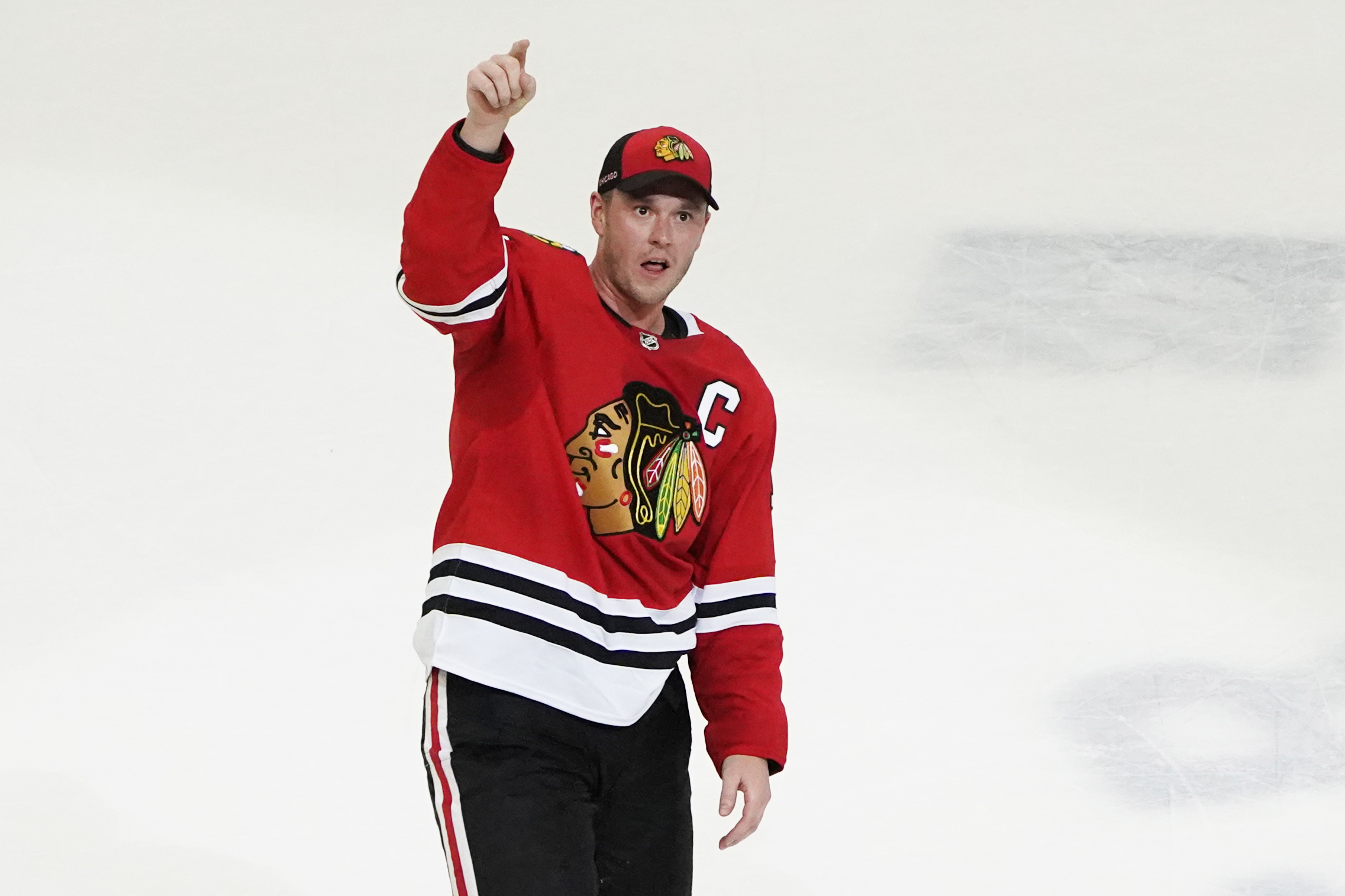In the fast-paced world of professional hockey, mental health is more than just a passing topic; it’s critical for player development and team cohesion. As the Chicago Blackhawks’ transformative offseason nears its end, the focus shifts to how players are strengthening their mental resilience. With resources and strategic support from the coaching staff, the emphasis on sports psychology is set to enhance both individual and team dynamics. By leveraging new mental performance tools and tailored support from coaches and management these efforts are expected to create ripple effects that influence the Blackhawks’ rebuilding process and pave the way for future success.
Mental health in hockey manifests in various ways that can affect their on-ice expertise. For some, the importance of mental health became clear during the challenges of COVID-19. The pandemic impacted daily life and presented new difficulties for professional athletes. Former Blackhawks captain Jonathan Toews shared his health struggles during this time, as he faced crucial decisions about what was best for himself and his future.
“Tazer’s” Home Forever
In October 2021, Toews was placed on the COVID list–a concerning time for the team as they had just gotten him back after he missed the previous season due to chronic immune response syndrome. In a video posted to his X account, Toews shared how his condition affected him:
“I couldn’t quite recover and my immune system was reacting to everything that I did. Any kind of stress, anything that I would do throughout the day, there was always kind of that stress response. So it took some time and that was the frustrating part…but thankfully got a great support team of people that helped me through it and learned a lot about the stress I put in my body over the years.”
Though Toews wasn’t always vocal about what was going on, he knew his health and recovery were more important–even after being placed on injured reserve following a concussion in February 2022.
By March 2023, Toews acknowledged the importance of prioritizing his well-being, telling NBC Sports Chicago,
“I’ve gotten to the point where my health is more important,” Toews said. “I know I could, as I’ve kind of shown these last few years, even though I have my own personal standards and am not happy with the way I’ve performed. I feel like I have much more to give with my experience in the game and knowing how to play the game, but when day after day you’re pushing through pain, it’s just like, to what end?”
A few weeks later, Jonathan Toews played his last game with the Chicago Blackhawks, the team where he spent his entire NHL career.
“Showtime” in New York
In hockey, mental health can be significantly impacted by an injury that disrupts your season. Transitioning from on-ice gameplay to the hours of rehab can be challenging. Regaining a routine through recovery is crucial, as it affects both your physical and mental well-being.
Beloved hockey fans know the name Patrick Kane, also known as “Showtime,” for his incredible seasons with the Blackhawks organization. Despite his trade to New York, Kane has always been clear that he wants to play for as long as possible, regardless of injuries. However, during his single season with the New York Rangers, Kane faced challenges due to an injury that required hip resurfacing.
In an interview with ESPN’s NHL reporter Emily Kaplan, Kane discussed his recovery and what it means to return to the game. Despite the surgery and hours of rehab, Kane expressed his desire to come back because of the “sour taste in [his] mouth after last year…this was because of an injury, it’s just kind of one part of my body that didn’t feel good.” Kane even mentioned that when he’s feeling healthy he considers himself one of the top players in the league.
Describing the pain he felt in his hip over the last few years, Kane said,
“Anytime I took a hit on the right side of the hip, the joint would compress, and I would basically feel bone on bone. Your leg shuts down for 45 seconds, and you just feel pain.”
After putting in countless hours of rehab and focusing on his overall well-being, Patrick Kane remained in the league…just now on a Blackhawks rival team.
Goaltender and Advocate
Las Vegas Golden Knights goaltender Robin Lehner, who spent the 2019-2020 season with the Blackhawks, has openly shared his struggles with mental health. Lehner revealed he dealt with suicidal thoughts, addiction, and was later diagnosed with bipolar disorder, ADHD, PTSD, and trauma.
In an article he wrote for The Athletic, Lehner reflected on his 2018 season with the Buffalo Sabres, where he experienced severe depression and increased drinking. He wrote, “I was self-treating myself because I could not be inside my own head by myself.”
Lehner emphasized the importance of a conversation with his lawyer that made him realize he needed to go to rehab. He wrote, “I contacted ‘the program’ supported by the NHL and the NHLPA. I told them I needed help, but I never let on to the severity of the situation. No one knew.”
He described detox to be very rough, and even after achieving sobriety, his next challenging was returning to hockey. He hesitated to reveal his bipolar diagnosis due to the stigma. However, when the New York Islanders called, he felt accepted and grateful that a team was willing to take a chance on him.
After just one season, the Blackhawks brought Lehner on board. He used his platform to advocate for mental health by featuring the hashtag #samehere on his helmet. For Lehner this meant:
“I’ve faced challenges in life too. Those challenges have affected my mental health. It’s a sign that we hope will unite the world to once and for all, normalized how universal this topic is.
Mental Health in Hockey
To educate players and reduce the stigma around mental health in hockey, the NHLPA partnered with Opening Minds and Mental Health. This collaboration aimed to strengthen members’ knowledge and skills. The program, called “First Line,” provides an educational and supportive environment designed to increase awareness of various mental health issues. It also fosters peer-to-peer support and encourages players to become advocates for mental health.
How Hockey Players are Training Their Minds
Sports psychology, while not new, is often considered a niche within psychology. For hockey players, mastering the game involves more than just physical skill. It requires building and maintaining self-assurance under pressure and stress. Key strategies include visualization, imagery, and effective team dynamics and communication. According to Sporting Bounce, sports psychologists and coaches use these tools to tailor strategies that enhance both individual and team performance. Important aspects of this training include on- and off-ice team building exercises, group discussions, and goal setting. These elements help players develop mental toughness, stay focused under pressure, and recover from setbacks.
Psychology Meets Hockey: Blackhawks’ Approach to Mental Resilience
In 2016, the Chicago Blackhawks partnered with O2X Human Performance to enhance player development at all levels of the organization. This collaboration focuses on mental health in hockey, covering performance development, mental readiness, sleep and fatigue management, recovery protocols, accountability, debriefing, communication, and resilience.
For some players, the desire to win games is inherent. However, veterans often shift their focus to changing their mindsets. Centre Jason Dickinson, known for stabilizing Chicago’s rebuild despite being labelled a “late bloomer,” offers a different perspective. The Hockey News quoted Dickinson saying,
“When I hear that term, it sounds like your abilities started later, and I don’t think my abilities changed. I think my mindset changed. My mental strength changed. That’s the biggest thing.”
Small, yet significant changes like these push players to become more effective on the ice. They foster maturity in their mental strength and among teammates.
So, how do players gain control of mental health in hockey? Through the support of behavioral sport and performance psychologists or certified mental performance consultants (CMPC). Andrew Joy, who worked with the Blackhawks leading up to their 2015 Stanley Cup win, shared with NBC Sports Chicago that his off-ice experience was crucial. He felt it was just as important as the on-ice efforts. Since then, he has expanded his work beyond the Blackhawks, continuing to impact young athletes across the sport.
Privacy is essential as mental health in hockey remains a key focus for the organization. With a dedicated team of mental performance staff and supportive coaching, the Chicago Blackhawks are eager to unlock the potential of their players. In the mental game of resilience, time is a tricky factor. However, as the Blackhawks continue to rebuild, their commitment to mental performance tools and personalized support will be crucial in driving progress and laying the foundation for future success.
Main Photo: David Banks-USA TODAY Sports






